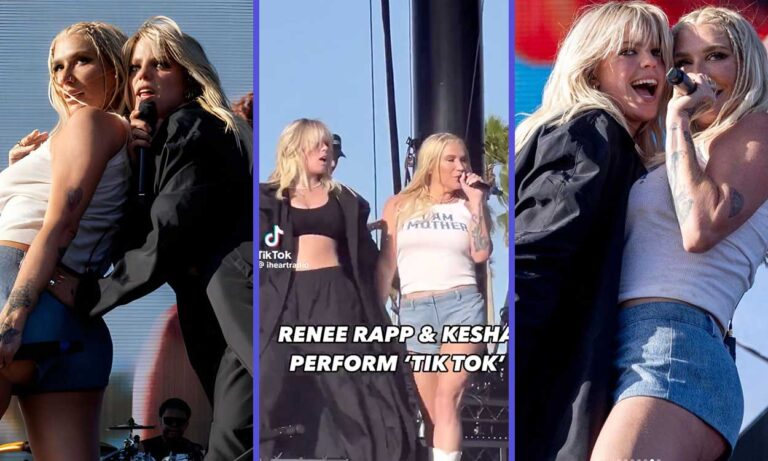Kesha calls out P Diddy during surprise performance with Reneé Rapp at Coachella

When you heard the words ‘Tik Tok’ about ten years ago, you wouldn’t immediately think of dance videos and pop culture rants. Instead, you’d think of one particular blonde singer in hotpants who undoubtedly ruled the year 2010. I am, of course, talking about Kesha and her smash hit ‘TikTok’, which propelled the artist into global fame and remains her biggest song to date. Well, the singer and songwriter made headlines this weekend when she joined Gen Z icon Reneé Rapp on stage at Coachella on Sunday 14 April 2024 for a duet of the chart-topper—with a twist.
Fans were naturally feral over the collab and things got even more interesting when the two notably updated a line in the lyrics, a decision which was met by cheers from the crowd and netizens online.
The song typically opens with the phrase: “Wake up in the mornin’ feelin’ like P Diddy.” But it was changed to “Wake up in the morning like, f*ck P Diddy,” which the artists sang with their middle fingers raised.
KESHA JUST CHANGED THE LYRICS FOR TIK TOK TO “FUCK P DIDDY” AT COACHELLA WITH RENEÉ RAPP OH MY GODDD pic.twitter.com/RrDvsyPKmo
— maxx HAS A BEYONCÉ AUTOGRAPH !!!! (@ArnoldMaxx) April 15, 2024
THE CHEMISTRY THESE LADIES HAVE!!!
— Simon 🐈🐆🐅 (@SimonIsHott) April 15, 2024
Kesha and Reneé Rapp need to collaborate on a project IMMEDIATELY. pic.twitter.com/7A12EFDt3S
Rapper and record producer P Diddy, or Puff Daddy, is currently at the centre of six lawsuits accusing him of physical violence, sexual abuse and sex trafficking stretching back to the beginning of his career in the 1990s. In February, a male music producer accused Combs of sexually assaulting him and forcing him to sleep with sex workers. The producer, who worked for Combs between September 2022 and November 2023, claimed Combs sexually harassed, drugged and threatened him for more than a year.
Kesha is unfortunately no stranger to calling out predators with her music. The artist has undergone an incredible transition in the past few years, one that saw her go from an ironic dance music staple to a strong and empowered pop icon that fuelled her pain into heartfelt music.
It all started in 2014, when the singer became enwrapped in a series of lawsuits and countersuits, all centring on accusations that her former producer, Dr Luke, or Łukasz Sebastian Gottwald, “sexually, physically, verbally and emotionally” abused her since the beginning of their professional relationship. The singer recounted how Gottwald had even drugged and raped her on two occasions, made threats against her family, and called her derogatory names.
A centrepiece of the case was releasing Kesha from her contract with Kemosabe Records, Gottwald’s record company existing under the umbrella of Sony Music Entertainment, which features notable artists such as Doja Cat and Becky G.
The artist’s legal battle gave rise to the infamous #freekesha movement and the artist received notable endorsements from colleagues such as Taylor Swift.
While still signed to his label, Kesha also started to release music that openly called out her abuser, including her 2017 hit ‘Praying’ from her album Rainbow, which critics interpreted as a middle finger to the producer.
I regularly cry to Kesha singing “Praying” at the 2018 Grammys with Dr. Luke sitting in the audience … when Cindi puts her hand on her shoulder… the rage at the end. It’s an absolutely perfect moment https://t.co/JyRqbrXinM pic.twitter.com/h0fMp9wvm1
— erb (@bentleyliz2) June 14, 2023
Kesha’s contract finally came to an end in December 2023 and the star’s liberation was celebrated all over social media.
Everyone stream Kesha today. Today is her day!!!! #freekesha #keshaisfree pic.twitter.com/IzxRHSq8Wg
— TOPHER 💋 (@topheryng) June 22, 2023
They knew kesha won the moment they obviously all agreed upon the fact that, yes he is a public figure, funny how dr luke immediately dropped the lawsuit
— ༺CRIS༻ (@crissuxxx) June 22, 2023
An innocent man wouldn’t. #FREEKESHA pic.twitter.com/GBA9f5hNpf
I’M SO HAPPY FOR HER #FreeKesha https://t.co/f4ooyQe8Vp
— elly belle 🔮🍉🇵🇸 (they/them) (@literElly) June 13, 2023
Now, the singer is creating music as free woman with her new album expected to touch on this feeling of newfound independence. Kesha’ last album under Dr Luke’s label was aptly titled ‘Gag Order’.





